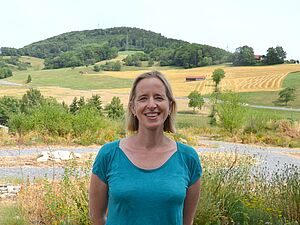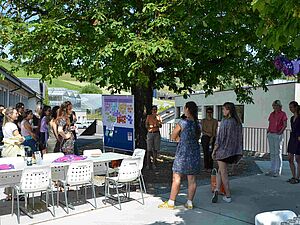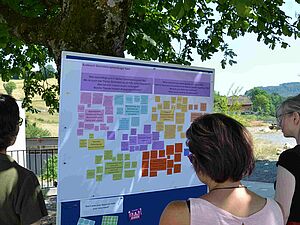"A lot has happened on the topic of equality"
50th anniversary voices
Natacha Bodenhausen has worked as a scientist at FiBL Switzerland since 2017. She was a co-initiator of the FiBL women's strike initiative. (Photos: FiBL, Andreas Basler)
Natacha Bodenhausen has worked as a scientist in the Nutrient Management & Symbiosis group since 2017. For two years, she was a member of the staff committee at FiBL Switzerland and in this capacity she was also specifically involved in gender equality issues. She was a co-initiator of the FiBL women's strike initiative.
Throughout Switzerland, there was a women's strike on 14 June 2023. FiBL was also involved. In what way?
About 30 people, including a few men, stopped their regular work in the afternoon, had a coffee break together and discussed gender equality issues at FiBL. Part of the group went to the demonstration in Zurich, for which we had made posters together beforehand.
What is the situation at FiBL Switzerland as far as gender equality is concerned?
When the last Swiss women's strike took place four years ago, there was no initiative supported by FiBL. Since then we have done a lot on the topic of equality: three years ago, we held our first workshop on the subject. Through that we developed recommendations for action by a group of FiBL employees and we elected two equal opportunities officers.
What else has happened since then?
At the various levels – directorate, department lead, group lead – there are now significantly more women in management positions. This was consciously promoted and was also accompanied by the appointment of deputies or co-leaders for all management functions. Co-leadership is new, especially at the department level. Among other things, this makes it easier to reconcile work and family life. There were also several workshops with a diversity expert and some FiBL employees meet in a peer group for regular exchange.
What could be improved?
This was a topic during FiBL’s women's strike initiative. I think we have already achieved a lot. Some women still feel disadvantaged when it comes to their salary; theoretically it should be the same for women and men, and FiBL is having this checked by an independent body. Then there is, for example, the desire to better promote women. An area where, despite a lot of progress, more should be done, is in the visibility of women, for example in photos, on podiums or as course leaders. Awareness of inclusive language has also increased significantly, but there is still room for improvement.
How did the issue of gender equality come to receive more attention at FiBL?
In 2020, the directorate was re-staffed – with three men. As a result, a number of women got together to promote the issue of gender equality at FiBL. In my view, that is typical of FiBL, something is happening "from below". However, we were then also supported "from above", so that we were able to hire an expert to moderate the workshop.
Another personal question, how do you reconcile work and family life?
I have two children, aged 10 and 13. For me, the conditions at FiBL are great. I work a lot on the computer and can organise my working hours quite flexibly and sometimes also work from home. Of course, this is not possible for all jobs at FiBL, for example the people who work in the restaurant or in the laboratory. I also really appreciate the fact that I compensate my overtime. This is not the case for all jobs in the science sector.
Interview: Theresa Rebholz






